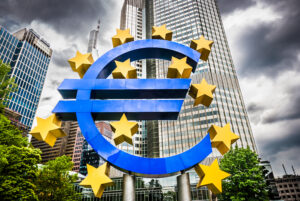Positive Money Europe’s Vicky van Eyck offers her perspective on the possibilities a digital euro could present
The fall of Silicon Valley Bank and the bailout of Credit Suisse has resurged the possibility of a wider banking crisis. This debate is forcing us to ask ourselves once again what the purpose of banking is and how it can best serve society. Once we acknowledge that money and payments infrastructure are public goods, it becomes clear that we should treat them as such by introducing a public digital euro.
With everything going on in the world, from the cost of living crisis to increasingly grave climate crisis warnings, why should we care about the latest financial turmoil resulting from the collapse of Silicon Valley Bank and Credit Suisse?
The crisis that has emanated from the US banking system reveals once again the core tension between the two main functions of banks, and the inherent fragility that emerges from their combination.
“The crisis in the US banking system reveals once again the core tension between the two main functions of banks”
Firstly, banks provide a critical public service by processing payments. Unless you are willing to keep all of your money in cash, you are forced to lend your income to a private bank. This is because banks are the only institutions with access to central bank money, the publicly-issued money required for settling payments between banks, in digital form. Meanwhile we, the public, are only able to access central bank money through banknotes and coins.
The second main function of banks is to make profits by remunerating themselves against risky lending. By doing that, banks are supposed to play a critical role in financing the needs of households and companies to run their businesses and make investments.
“Banks are always potentially on the verge of going bankrupt, if customers suddenly lose trust in their banks”
Combining these functions makes banks inherently fragile, because of the mismatch between the deposits collected and the longer maturity of the loans they issue. As customers can theoretically withdraw their deposits at any time, the banks are always potentially on the verge of going bankrupt, if customers suddenly lose trust in their banks.
Too big to fail banks
Letting banks fail would be fine if only the consequences would not be so dramatic for society. But money and payments are one of a number of key public goods that the very functioning of our society is dependent on, alongside utilities such as water, electricity and telecoms. If a bank fails, businesses will be unable to pay workers, and households would be unable to pay their bills or buy essentials like food. And if the bank failure is big enough, it could drag the entire economy down with it, as we saw in 2008 with the failure of Lehman Brothers. No other private industry has been given such free rein to make business through risk-taking, and cause as much damage as banks have.

The immense power of banks rests on their ability to create and take the money deposits that we rely on for making payments. Although risky bank deposits and non-risky central bank money (e.g. banknotes) are not technically the same, in practice their value is kept equal because the state has put in place deposit insurance schemes. These insurance schemes aim to avoid the situation where a bank failure results in the destruction of millions of people’s well-earned savings. To avoid this, governments have committed to reimburse customers’ deposits even when a bank fails. Under EU regulation, this protection goes up to €100,000 per bank account.
“Why do we continue to let banks use their privileged position as a basis for making bets”
This protection sounds great in principle, but it creates a moral hazard, as it offers a safety net for banks to make risky loans without having to pay the price for it in case the bank fails.In practice, deposit insurance schemes are only very rarely activated. As we saw in the case of Silicon Valley Bank and Credit Suisse, governments decided to step in to avoid the need to activate the deposit insurance scheme. One way or another, it’s the public that has to pay for the failure of banks.
This then begs the question of why we continue letting them get away with using their privileged position as a basis for making bets where the rewards are privatized and losses socialized, as we saw with Silicon Valley Bank.
Digital euro: safe money without banks
Fortunately, there is a better and simpler solution to protect bank deposits. The introduction of a digital euro, as currently being envisaged by the European Central bank, has the potential to solve this problem once and for all. With a digital euro, anyone would be able to hold central bank money in a safe digital wallet. Just like banknotes and coins, digital euros would be totally free of risk, because they will represent a claim on the central bank, which has the power to create money and cannot go bankrupt, and not on private banks.
In other words, as Financial Times’s commentator Martin Sandbu wrote, a digital euro ”would provide precisely what seems to be missing today: a means by which businesses could keep cash completely safe, without any need for banks.”
This analysis was also shared by Lucrezia Reichlin, a former European Central Bank official, who wrote that the current situation “forces us to ask whether it would not be more efficient to bypass the banks altogether by allowing depositors – both retail and corporate – to keep their funds at the central bank, through the issuance of a central bank digital currency. That would be a comprehensive form of deposit insurance ex ante.”
In this way, a digital euro would also simplify the system. It would get rid of the need to paper over the cracks with an increasingly complex maze of regulation very few can understand, as has been the response after every recent crisis.
The digital euro offers us the opportunity to finally re-establish money as a truly public good that serves the interests of society as a whole. In addition to improving the stability of the financial system, it would provide a universally accessible and safe electronic form of public money, in particular for those on the margins of the economy, who currently do not have access to financial services.
The exact details of how a digital euro will be introduced remain to be seen, as the European Commission is preparing a legislative proposal for the digital euro to be released in June. Yet already many people have already voiced concerns for privacy, the disappearance of physical cash, and for the inclusiveness of this new system for all members of society, especially the most vulnerable ones.
The underlying worry is that the type of digital euro that the ECB has in mind is being designed with and for the interest of the banking sector. This is manifested for example by the insistence of the ECB to talk about introducing digital euro solely through the intermediation of banks, thus carefully avoiding putting into question the powerful role of banks.

As an institution designed to serve the public good, the ECB must ensure a true democratic debate involving a plurality of voices takes place before deciding on how to introduce the digital euro. Only in this way can the EU hope to win over the public, and to prevent the project from dying an early death due to public backlash.
Vicky Van Eyck is the Executive Director at Positive Money Europe, a non-profit organization based in Brussels working towards a fair, democratic and sustainable economy.







